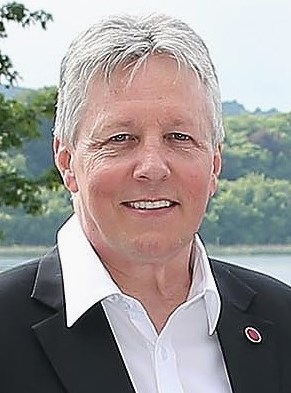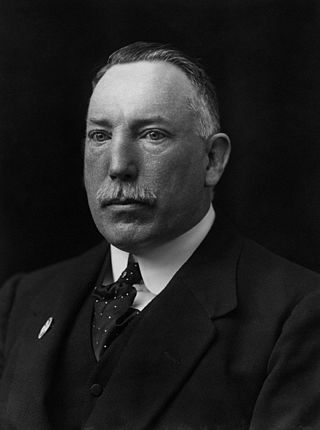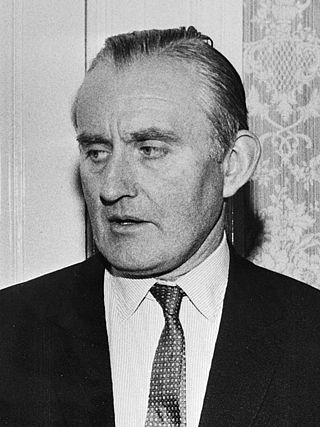
The Ulster Unionist Party (UUP) is a unionist political party in Northern Ireland. The party was founded as the Ulster Unionist Council in 1905, emerging from the Irish Unionist Alliance in Ulster. Under Edward Carson, it led unionist opposition to the Irish Home Rule movement. Following the partition of Ireland, it was the governing party of Northern Ireland between 1921 and 1972. It was supported by most unionist voters throughout the conflict known as the Troubles, during which time it was often referred to as the Official Unionist Party (OUP).

Fermanagh and South Tyrone is a Northern Ireland parliamentary constituency in the British House of Commons. It is currently represented by Pat Cullen of Sinn Féin.

South Antrim is a parliamentary constituency in the United Kingdom House of Commons. The current MP is Robin Swann of the Ulster Unionist Party (UUP), first elected in the 2024 general election.

Belfast South was a parliamentary constituency in the United Kingdom House of Commons.

North Down is a parliamentary constituency in the United Kingdom House of Commons. The current MP is Alex Easton, elected at the 2024 United Kingdom general election.

The 2005 United Kingdom general election was held on Thursday 5 May 2005, to elect 646 members to the House of Commons. The governing Labour Party led by Prime Minister Tony Blair won its third consecutive victory, with Blair becoming the second Labour leader after Harold Wilson to form three majority governments. However, its majority fell to 66 seats; the majority it won four years earlier had been of 167 seats. The UK media interpreted the results as an indicator of a breakdown in trust in the government, and especially in Blair.
This is an overview of United Kingdom general election results since 1922. The 1922 election was the first election in the new United Kingdom of Great Britain and Northern Ireland, after the creation of the Irish Free State removed Southern Ireland from the UK.

The 2011 Northern Ireland Assembly election took place on Thursday, 5 May, following the dissolution of the Northern Ireland Assembly at midnight on 24 March 2011. It was the fourth election to take place since the devolved assembly was established in 1998.

The 2015 United Kingdom general election in Northern Ireland was held on 7 May 2015 and all 18 seats were contested. 1,236,765 people were eligible to vote, up 67,581 from the 2010 general election. 58.45% of eligible voters turned out, an increase of half a percentage point from the last general election. This election saw the return of Ulster Unionists to the House of Commons, after they targeted 4 seats but secured 2.

The 1923 United Kingdom general election in Northern Ireland was held on 6 December as part of the wider general election. There were ten constituencies, seven single-seat constituencies with elected by FPTP and three two-seat constituencies with MPs elected by bloc voting. Only three of the constituencies had contested elections.

The 1951 United Kingdom general election in Northern Ireland was held on 25 October as part of the wider general election with 12 MPs elected in single-seat constituencies using first-past-the-post.
The 1955 United Kingdom general election in Northern Ireland was held on 26 May as part of the wider general election with 12 MPs elected in single-seat constituencies using first-past-the-post.
The 1959 United Kingdom general election in Northern Ireland was held on 8 October with 12 MPs elected in single-seat constituencies using first-past-the-post as part of the wider general election in the United Kingdom.

The 1966 United Kingdom general election in Northern Ireland was held on 31 March with 12 MPs elected in single-seat constituencies using first-past-the-post as part of the wider general election in the United Kingdom.

The 1970 United Kingdom general election in Northern Ireland was held on 31 March with 12 MPs elected in single-seat constituencies using first-past-the-post as part of the wider general election in the United Kingdom. It was the first general election held after the Representation of the People Act 1969 which reduced the voting age from 21 to 18.

The February 1974 United Kingdom general election in Northern Ireland was held on 28 February with 12 MPs elected in single-seat constituencies using first-past-the-post as part of the wider general election in the United Kingdom.

The October 1974 United Kingdom general election in Northern Ireland was held on 10 October with 12 MPs elected in single-seat constituencies using first-past-the-post as part of the wider general election in the United Kingdom.
The 1979 United Kingdom general election in Northern Ireland was held on 3 May with 12 MPs elected in single-seat constituencies using first-past-the-post as part of the wider general election in the United Kingdom.

The 1983 United Kingdom general election in Northern Ireland was held on 9 June with 17 MPs elected in single-seat constituencies using first-past-the-post as part of the wider general election in the United Kingdom. This was an increase of five seats, after the House of Commons Act 1979 had come into effect to account for the reduced representation after direct rule had been imposed since 1972. New constituencies were drawn up in 1982.

The 2019 United Kingdom general election was held on 12 December 2019 to elect all 650 members of the House of Commons, including 18 seats in Northern Ireland. 1,293,971 people were eligible to vote, up 51,273 from the 2017 general election. 62.09% of eligible voters turned out, down 3.5 percentage points from the last general election. For the first time in history, nationalist parties won more seats than unionist parties.














